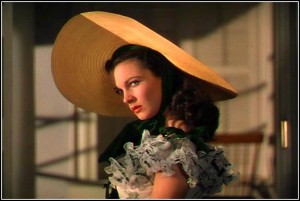 10. Characters are how readers connect to story
10. Characters are how readers connect to story
I’ve read books about the history of eras, and while interesting, they are nothing compared to a good biography (I’m currently reading H. W. Brands’ biography of Andrew Jackson). Why? Because we are more fascinated with people than epochs. (I once heard history described as “biography on a timeline.”)
We all love twisty turny plots, chases, love, hate, fights, freefalls––all of that. But unless readers connect to character first, none of that matters.
9. On the other hand, character without plot is a blob of glup
Contrary to what some believe, a novel is not “all about character.” To prove the point, let’s think about Scarlett O’Hara. Do you want 400 pages of Scarlett sitting on her front porch, flirting? Going to parties and throwing hissy fits? I didn’t think so. What is it that makes us keep watching Scarlett? A little thing called the Civil War.
A novel is not a story until a character is forced to show strength of will against the complications of plot. Plot brings out true character, rips off the mask, and that’s what readers really want to see.
“Blob of glup,” by the way, is a term I remember from my mom reading me The Thirteen Clocks by James Thurber. I always thought it quite descriptive.
8. Lead characters don’t have to be morally good, just good at something
Two of the most popular books in our language are about negative characters. I define a negative character as one who is doing things that the community (theirs, and ours) do not approve of, that harm other people. A Christmas Carol has Scrooge, and Gone With the Wind has Scarlett. Why would a reader want to follow them?
Two reasons: They want to see them redeemed, or they want to see them get their “just desserts.”
The trick to rendering a negative Lead is to show, early, a capacity for change. When Scrooge is taken back to his boyhood, we see in him, for the first time, some compassionate emotion. Maybe he’s not a lost cause after all!
Or show that the negative character has strength, which could be an asset if put to good use. Scarlett has grit and determination (fueled by her selfishness) and just dang well gets things done. We admire that, and hope by the end of the book she’ll turn it to something that actually helps those in her world. She does, but by then it’s too late. Rhett just doesn’t give a damn.
7. Characters need backstory before readers do
Yes, you have to know your character’s biography, at least the high points. One question I like to ask is what happened to the character at sixteen? That’s a pivotal, shaping year (unless your character actually is sixteen, in which case I’d go to age eight).
But you don’t have to reveal all the key information to readers up front. In fact, it’s good to withhold it, especially a secret or a wound. Show the character behaving in a way that hints at something from the past, currents below the surface. Why does Rick in Casablanca stick his neck out for nobody? Why does he play chess alone? Why doesn’t he protect Ugarte? Why doesn’t he love Paris? We see him act in accord with these mysteries, and don’t get answers until well into the film.
6. But readers want to know a little something about the character they’re following
Against the advice that you should have absolutely zero backstory in the first fifty pages, I say do what Stephen King, Dean Koontz, Michael Connelly and most every bestselling novelist does: sprinkle in bits of backstory in the opening pages. But only what is necessary to help readers bond to character.
A rule of thumb I give in my workshops is this: In the first ten pages, you can have three sentences of backstory, used all together or spread out. In the next ten pages, you can have three paragraphs of backstory, used all together or spaced out. This will force you to examine closely what you include, saving the rest for later, and letting the story get cracking.
5. Memorable characters create cross-currents of emotion in the reader
We all know about inner conflict. A character is unsure about what he’s about to do, and there’s an argument in his heart and soul, giving him reasons both for and against the action. That’s good stuff, and one way to get there is to identify the fear a character feels in each scene.
But to create even greater cross-currents of emotion in the reader, consider having the character do something the absolute reverse of what the reader expects. Brainstorm ideas for this, and you’ll often find a great one down the list, beyond your predictability meter. Put that action in. Write it. Have other characters react to it.
Only then find a way to justify the behavior, and work that into your material.
It was E. M. Forster, in Aspects of the Novel, who defined “round” (as opposed to “flat”) characters as those who are “capable of surprising us in a convincing way.”
4. Great villains are justified, at least to themselves
The antagonist (or as I like to put it, the Opponent) is someone who is dedicated to stopping the Lead. It does not have to be a villain, or “bad guy.” It just has to be someone on the other side of one definition of plot: two dogs and one bone.
When you do have a bad guy opponent, don’t fall into the trap of painting him with only one color. The pure-evil villain is boring and manipulative, and readers won’t fall for it. You’re also robbing them of a deeper reading experience (for which they’ll thank you by looking for your next book).
One exercise I give in workshops is the opponent’s closing argument. Pretend they have to address a jury and justify their actions. They are not going to argue, “Because I’m just a bad guy. I’m a psycho. I was born this way!” No bad guy thinks he’s bad. He thinks he’s right.
Make that argument. Weave the results into your book.
3. Don’t waste your minor characters
One of the biggest mistakes I see new writers make is putting stock characters into minor roles: The burly bartender, wiping glasses behind the bar; the boot-wearing, cowboy-hat-sporting, redneck truck driver; the saucy, wise-cracking waitress.
Instead, give each minor character something to set him or her apart from the stereotype. Think of:
• Going against type (a female truck driver, for example)
• An odd tick or quirk
• A distinct speaking style
Use minor characters as allies or irritants. Even those who have only one scene. A doorman, for example. Instead of his opening the door for your Lead, have him give the Lead a hard time. Or have your Lead in a hurry but the cab driver is lethargic and chatty.
A little time spent on spicing up minor characters will add mounds of reading pleasure to your readers.
2. Great characters delight us
When I ask people to name their favorite books or movies, and then ask why, it’s invariably because of one great character. As good as Harrison Ford is in The Fugitive, people always mention Tommy Lee Jones, and even his famous line, “I don’t care!”
The Silence of the Lambs? Two great characters. The absolutely unforgettable Hannibal Lecter, and the insecure but dogged trainee, Clarice Starling. Lecter delights us (because we are all a little twisted) with his wit, deviousness, and dietary habits. Clarice delights us because she’s the classic underdog who fights both professional and personal demons.
1. Great characters elevate us
Truly enduring characters end up teaching us something about humanity and, therefore, about ourselves. They elevate us. And that is true even if the character is tragic. As Aristotle pointed out long ago, the tragic character creates catharsis, a purging of the tragic flaw, thus making us better by subtraction.
On the positive side, I think of Harry Bosch and Atticus Finch, both on a seemingly impossible quest for justice. I’m the better for reading about them, and those are the kinds of books I always read more than once.
On the negative side, I think of the aforementioned Scarlett O’Hara. We are pulling for her to do the right thing, to get with it, to join the community of the good. Then she goes off an marries some other guy she doesn’t love and uses him mercilessly. When she finally suffers the consequences of her actions we, too, are duly warned.
So, TKZers, when you think of an unforgettable character, who comes to mind? What is it about this character that moves you? Elevates you? Makes you want more of the same?




